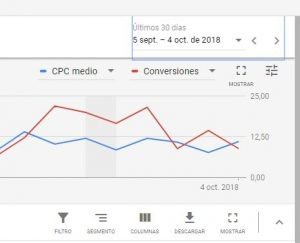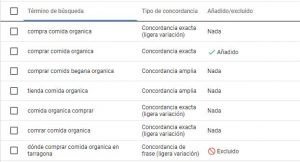Cómo optimizar los términos de búsqueda en Google Ads
Una vez tenemos nuestra campaña publicitaria habilitada en Google Ads, con sus grupos de anuncios y sus palabras clave correspondientes, sólo queda esperar a que los anuncios se muestren para así poder analizar los datos desde el momento de su inicio de actividad. Dentro del análisis posterior a la activación de una campaña, hay que tener en cuenta muchos factores que influyen en su rendimiento, y uno de ellos es el informe de términos de búsqueda.
¿Qué es el informe de los términos de búsqueda?
El informe de los términos de búsqueda es una recopilación de todas las búsquedas realizadas por usuarios que han activado tu anuncio y que, tras mostrar el anuncio con dicha búsqueda, han hecho clic en él. Este informe también permite ver el número de impresiones y clics que ha tenido, el coste que ha supuesto y si ha generado conversiones, entre otros muchos datos. Lo puedes ver tanto de manera general (a nivel campaña) como a nivel más específico (a nivel grupo de anuncios), aunque lo ideal es que te centres a nivel Ad Group para profundizar más en los términos de ese grupo y poder detectar más fácilmente las posibles incoherencias y rectificarlas para mejorar su rendimiento.
En decir, puedes conocer el comportamiento de tu público objetivo y si los términos de búsqueda son realmente los adecuados para activar tus anuncios. Es muy importante no confundir palabras clave con términos de búsqueda. Por un lado, las palabras clave son aquellas que el anunciante (nosotros) elegimos intencionadamente para cada anuncio, y los términos de búsqueda son las palabras que ha utilizado el usuario para realizar una búsqueda.
Pasos para acceder al Informe de Términos de Búsqueda
- Selecciona la campaña deseada.
- Dentro de los grupos de anuncios, escoge el que quieres analizar primero.
- En el menú lateral de Google Ads, entra en el apartado llamado “Palabras Clave”.
- Dentro de la categoría de Palabras Clave, en el menú superior, haz clic en “Términos de búsqueda”.
- Selecciona en la parte superior derecha el periodo de tiempo que desees analizar.
- Por último, en el apartado columnas, selecciona todos los ítems que quieras visualizar y, si lo deseas, puedes hacer filtros para que tu análisis sea más concreto (por ejemplo, que el informe solo te muestro términos de búsqueda sin conversiones y con un coste superior a 10€ en los últimos 30 días).
¿Cómo puedo optimizar el tráfico de mis anuncios con los términos de búsqueda?
Para optimizar tus campañas, debes revisar constantemente los términos y añadir o excluir aquellos que sean necesarios para mejorar la calidad de tus anuncios y conseguir un mejor rendimiento.
Esto quiere decir que, si observas que a través de un término de búsqueda se muestra muchas veces el anuncio, aporta conversiones y el retorno de la inversión publicitaria es positivo, puedes añadir ese término como palabra clave para que haya más probabilidades de que se active el anuncio cuando alguien haga esa búsqueda.
Por el contrario, si observamos que hay términos de búsqueda que generan demasiado coste y no aporta conversiones o su retorno de inversión publicitaria no es el deseado, podemos excluirlo para que la próxima vez que algún usuario emplee ese término de búsqueda, no se active el anuncio. También puede ocurrir que un término de búsqueda no tenga nada que ver con el producto anunciado, por lo que también deberá excluirse para mejorar su rentabilidad. Para el resto de términos que se ajustan al anuncio, deberemos revisarlos constantemente para ver si son rentables en el tiempo o no.
¿Qué palabras negativas debo utilizar para optimizar mis campañas?
Por defecto, si seleccionamos un término de búsqueda y seguidamente “añadir como palabra clave negativa”, este término se excluirá con la concordancia exacta. Es decir, el anuncio no se mostrará cuando el término de búsqueda sea exactamente el mismo, sin palabras adicionales ni alteraciones en el orden.
Por tanto, si observas que un término sin coherencia con el anuncio se repite, puedes añadirlo como palabra clave negativa con la concordancia de frase, para que siempre que se muestre con ese orden no active el anuncio, sin importar que haya palabras adicionales en la búsqueda (por ejemplo “con gas de limón” en un anuncio de zumos de limón).
Por el contrario, si observas que se repiten palabras sin relación alguna con el anuncio, puedes negativizar sólo esa palabra, pero esta vez con la concordancia amplia negativa (por ejemplo “naranja” en un anuncio de zumos de limón). Es decir, siempre que un término de búsqueda incluya esa palabra, nunca se activará el anuncio, sin importar el orden ni las palabras adicionales.
¿Con qué frecuencia debemos analizar el informe de términos de búsqueda?
En resumen, la frecuencia dependerá tanto de la duración de la campaña como de su propio volumen. Sin embargo, independientemente de esto, es recomendable hacer como mínimo una revisión semanal para observar posibles incoherencias que puedan afectar al coste, a la calidad y al rendimiento.
Si tienes cualquier duda puedes dejarla en los comentarios o por el contrario, si deseas más información, podrás encontrar gran variedad de artículos sobre publicidad en Adwords?








